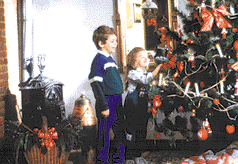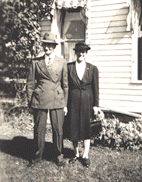Midwest Today, January 1997
C O U N T R Y
C H R O N I C L E

REMEMBRANCES OF
CHRISTMASES PAST
By OLGA JORDAN
During the Depression years, many families didn't exchange gifts
at Christmas, because times were tough.
Still, my brothers, sisters and I looked forward to Christmas
as all children did then and now. Mother would be in the kitchen
baking dozens of cookies, decorating them with the likes of an
artist. She also baked various kinds of fruit breads. A special
treat was a steamed suet pudding, which was very rich and served
with a special sauce. How we looked forward to all the goodies!
She rarely needed to use a recipe, unless it was a new one she
wanted to try.
Along with all the baking, she made special efforts to make Christmas
the most enjoyable celebration of the year.
My parents had been living on a farm, and I was the fifth child
of six children. They worked hard all their lives, as did other
farm families. Modern conveniences didn't exist at the time. But
we were happy.
One thing we youngers enjoyed is when dad hitched up a team of
Percheons, Sly and Babe, to pull a sleigh in the Wintertime to
take us to church two miles away, or visit neighbors and friends
who lived nearby. Sometimes, we were taken to and from school
in one. Cars were difficult to start in cold weather, and roads
not fit.
Dad had two robes -- a brown one and black one -- made from animal
hides, and they really kept us toasty warm in the sled.
Christmas Eve was a special event at our church, which was always
packed. It was beautifully adorned with candles on the windowsills
and greenery here and there. A gold star hung from the ceiling
above the pulpit. A tall, live Christmas tree was set in front
of the church in one corner. It was decorated by the young men
and women of the congregation. There were no strings of electric
lights available in those years, so five to six-inch tall candles
were put into holders that were then clipped onto the tree branches,
and lit.
The program began at 7 p.m. The congregation sang a Christian
hymn, our pastor read the Christmas story from Luke 2, and said
a prayer, followed with another Christmas song.
After several weeks of rehearsals, the children were ready to
perform. The first group were the five to ten-year-olds. Little
girls would walk to the stage, dressed in pretty dresses their
mothers had probably made. Some wore big bows in their hair. The
boys wore knee pants, a white shirt and a bow tie, with their
hair neatly combed. They sang all the verses of "Away In
the Manger," and recited a Christmas poem in unison.
The boys and girls, ages 11 to 13, took part in the re-enactment
of a manger scene. They were dressed in clothing or wraps, according
to Biblical history. They needed no prompting.
As the props were removed, the 14 to 16-year-old boys and girls
sang in harmony several Christmas carols.
The program was now over. Yet a tradition that had been practiced
for years was yet to be accomplished.
Many months before Christmas, parents would order large bags with
treats, one for each child, to be distributed after the Christmas
Eve program. Each bag contained an apple, orange, peanuts, mixed
nuts, a box of Crackerjacks, and a small amount of candy. They
cost only 50 cents. The bags were placed under the Christmas tree
at the church, and were distributed by some men in the congregation
as each family's name was called.
With wishes of a Merry Christmas and a Happy New Year echoing
throughout the church, we were on our way home.
Later, mother fixed us a cup of hot cocoa. To warm our beds, she
had foot warmers she had brought over from Germany -- larger than
a thermos and made of copper, filled with water heated on the
back of the old wood stove -- then wrapped in a piece of flannel.
The bedrooms were upstairs, heated only by stove pipes running
from the parlor stove. We slept between flannel sheets under handmade
quilts mother had sewn.
We had a goose for Christmas dinner, and vegetables preserved
from our big garden. Despite times of scarcity, none of us suffered.
We were rich in spirit and love.

The writer's parents, Jacob and Martha Buseman
of Grundy Center, Iowa in the 1930s.
| Click
Here To Recommend This Story To A Friend
|
Back to the top
Contents copyright 1995, 1996, 1997, 1998 and 1999.
All rights reserved.
-trans.gif)

-trans.gif)


